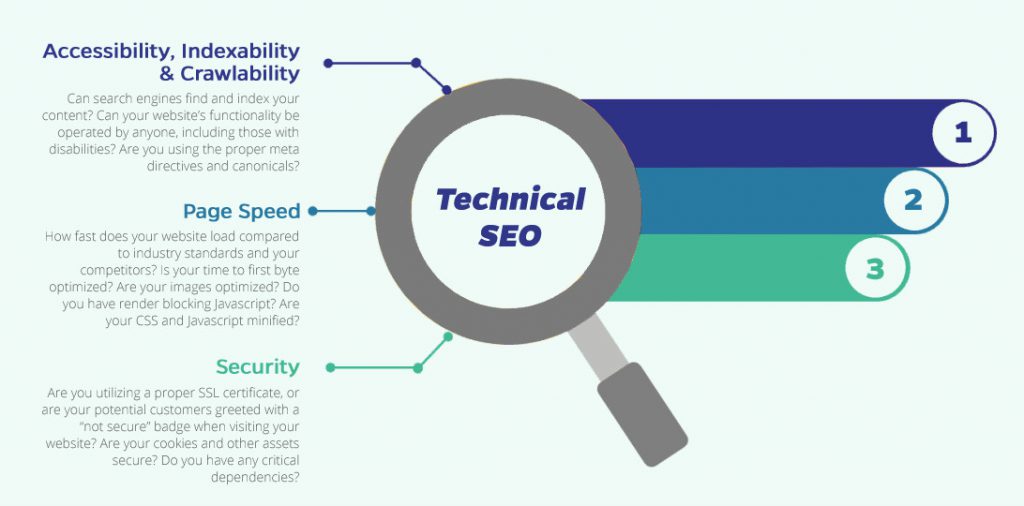Key SEO factors you will need to understand when launching a new website
Every person would like to set up a website based on SEO techniques but the bad news is that SEO is not an easy thing to do. Another problem with it is that it is not a onetime thing that you can just set once and then let it run on its own. With a lot of information available online, it is very difficult to know where to begin.
The main goal of creating a website is to drive traffic to your page that will eventually turn into clients. This can also be achieved via PPC campaigns that that can be created by a PPC Advertising Agency. These agencies will drive the targeted audience to your page while you have to pay for every click that they manage to attract to your page.
In this article we are going to look at 5 key SEO factors you will need to understand when launching a new website.
1. Setup your website for SEO

To earn a lot of traffic, you will need to set up your website for SEO. Setting your website for SEO does not mean changing the way your website interface. There are a lot of tools that will help you in doing this and most of them are free to use. With the help of these tools, you can get data and decide what to do with it. One of the tools you can start with is Google Analytics and using Google and Bing Search engines to see what they make of your site.
2. Researching for keywords
Searching on online search consoles take advantage of keywords, users use specific words or phrases to search for particular information. An SEO campaign starts with keywords and knowing what your targeted audience uses while searching for the products and services you provide is very important. You have to use tools to research and come up with words that people use in search engines.

When you have a list of keywords, you can use them to improve your content. This will also help you when you launch advertising campaigns by using the right keywords in your ads. The best way to make a campaign that is easy to analyze its results is to use PPC Ads. This can be done using PPC agencies that provide a lot of Digital marketing services out there. With a minimal budget, you can seek help from them to search keywords for you and set up an advertising campaign.
3. On-page SEO principles

On-page optimization is the best and easy way of SEO improvement that you can control. This technique allows your page to attract more traffic by being more relevant to keywords that are being searched. The main goal is to create a page that will provide information and answer questions for the targeted audience. So you should focus on being relevant and as supportive as you can.
If you have hired a PPC Advertising Agency, they should use relevant keywords that match with your landing page. The content within the page should contain information which the targeted audience is looking for otherwise they will bounce back. In order to optimize your page, you must consider the following;
- Create relevant title tags.
- Use of better meta descriptions.
- Have sensible URLs.
- Good arrangement of images.
- Create attractive headings.
- Improve your content.
4. Technical SEO

This part involves improving the non-content part of your website. This is the part that visitors do not see but it affects the way they interact and makes decisions when they visit your website.
This involves how a website performs, and how search engines are able to read (crawl) and index your pages. It is a foundation that holds the good work that you put into creating your website.
5. Steps to earning links
Setting and checking the links is very important due to the fact that, links are the connecting paths of the internet, they act as bridges that connect one site to another site. In addition, a link that directs one site to other acts as a citation that a target site is helpful and useful in some way. Search engines see this as an authority sign.

There are a lot of techniques that you can use to build your links based on the type of website. Be careful not to create spam links since Google’s crack-down will crash spam links.
Here some major steps that will guide you when building your links
- Make a research on who likes your website.
- Make a research to find out your competitors’ back-links.
- Compile or design your assets.
- Create a strategic link for earning plans.
Basing on the above tips whether you’re are launching a new website or updating your current website if you follow the steps mentioned you will be able to set up a website that will convert your audience into earnings. Make sure to use the above tips even if you want to hire an agency by choosing one among the many PPC Agencies available out there.
Google Claims Strong Correlation of Bad Links with Huge Targeted Traffic Loss
Digital marketing analyst from around the globe alleged a strong correlation of Bad links with the downsizing of traffic. There is no harm to getting notified and in a good pose in the ranking line but keep in mind that excessive bad links can get you penalized by Google.
Same as Google John Mueller revealed on webmaster question about bad links shown in search console and a huge drop in traffic rate. It might get you a strong positive correlation of bad links with at least a 50% traffic drop.
Google Search Console (GSC) reported more than 500 backlinks from two domains and that gave them a major drawback in letting down their traffic. Mueller revealed that “Yes there is a relation between referral links and a drop in Traffic.” It’s been said that GSC represented backlinks from those two domains to every page of their website. But on visiting those pages the content was not being shown over there and they were empty.
Google’s John Mueller reported a statement relative to these empty pages and resolved a mystery of “being empty”;
“It’s really hard to say what you’re seeing here. It’s certainly possible there are pages out there that show an empty page to users and then they show a full page to Googlebot.”
It was explained that one page was shown to Google and another page to everyone else who would see it. They called it cloaking. So they referred those pages to cloaking. He sacks the referral pages’ technical mistakes rather than attempting a trick to interrupt the publisher’s rankings.
Google’s John Mueller comments on a correlation between reprobate backlinks and traffic drop!!
“I don’t think this is something that you need to disavow. It probably looks weird in the links report but I really wouldn’t worry about this. With regards to the drop in traffic that you’re seeing, from my point of view that would probably be unrelated to these links. There’s no real situation… where I could imagine that essentially empty pages would be causing an issue with regards to links. So I would just ignore that.
If you decide to put them in the disavow file anyway… just keep in mind that this would not affect how we show the data in the search console. So the links report would continue to show those.
I don’t think there’s any reason to use a disavow file in this particular case. So I would just leave them be.”
would just leave them be.”

Are links actually doing roughly wrong? or Is it something else?

As far as we are concerned we can say that links may harm you and your site as well. But the question arises here is there anything else to tackle and identify those harms?
In a general opinion go for multiple audits and follow them as well.
Identify where your site stands and then move forward.
- Go for a Technical SEO audit to reveal potential crawl issues, technical mistakes, or anything that is letting down your site rankings.
- A thorough content audit gives you the real state of your website. A critical review audit on content will give better results to determine the content state.
- A major link profile audit to assess the possible and current state of the site’s overall link profile.
There you go, now you will be able to move a step forward with flexible solutions for fixing site issues. If you are able enough to adopt the complex issues, you will be going to get a long way with the targeted audience.
Social Media Management & Optimal Care Requires for Business Growth
Everything on social media needs to know what specifically it is? And what sort of management, we should seek. But the question arises here What is Social Media Management and on which perspective you should follow or care about.
Social media is making life easier and easier for the people who used to listen, communicate. And interact or collaborate with one another on validated and authentic platforms. But if we look upon the high burden on social media management it’s quite been risky to manage. Because it has been a huge process to look upon activities, track records, monitor conversations, and majorly with their management as well.
Social media management will let you check and count on the complete interactions. And maybe the conversational activities in small business marketing tactics. It leads to a more efficient and professional manner. Even such conversations of these marketing campaigns can be listened to, viewed via Blogs, Facebook/Twitter Posts, or maybe on some other private or public platforms just to interact with the community and let them know what is going trend.

So, you just need a business growth consultant to achieve your organizational goal. What basically this management will help you? Such type of management, social media will inform you about the reviews and feedback that what exactly people are thinking about your business, and what sort of outcomes you can receive from such business. Even activities such as Search engine marketing campaigns, email marketing, PPC management, online and offline marketing are included to get a precise idea about the mental perspective of people.
It’s been reported that people who are on social media are totally working as an igniting fuel who will decide which thing would blow up and which will not.
Do you need to care or not?
It’s a million-dollar question that either such types of conversations and interactions are helpful and should we care about it? Answer perfectly would be 100% because of such activities. You will perfectly get to know about your competitors, their brand place in the market, their major area of interest along with their expertise.
And for instance, if you do not come up for social media marketing. In that case, put to your attention what the market needs and what your competitors are doing so far. Or hire any business growth consultant to boost up your business potential.
Now the major node, do you need to care about negative comments. I guess the answer would be yes because such comments will let your brand start from where it could go into a downfall. Admit those negative comments and reviews. And let people such the freedom to report on what they got from your brand or business.
Generate leads to your business scale by opting to follow figures and facts;
- Content marketing in several public and private places will help you to monitor the thoughts of your customers.
- Optimally follow the Twitter Trends and the conversations people are doing on relevant conversations.
Google Enlightens the Fact That Which Pages Should Be Cast-off
John Mueller from Google has answered questions about how to identify pages to remove or block. He mainly clarified that even the low traffic pages are okay but low-quality ones are not.
In a Google Webmaster Hangout, Google’s John Mueller answered. Which low traffic pages to no index and which ones to not concerned about.
Are These Low Traffic Pages Unsafe?

It’s a million-dollar question that it’s better to remove the pages that are performing low in their index area. Low-quality pages are used to attract less audience. That is what makes the page harmful for a site or company. Google suggests removing the pages that have low-quality content and maybe no indexing, those pages should remove immediately.
That’s what the major concern and query John Mueller answered about.
This is the Question Being Asked to Him:
“We’re publishing news and articles.
For example, we have 100 new articles every day and ten of them give us 95% of the organic search traffic. Another 90 go nowhere.
We’re afraid that Google can decide our website is interesting only for 10%.
There’s an idea to hide some boring local news under a no-index tag to make the overall quality of all publishing content better.
What do you think?”
What Mueller Said:
“In general, we do look at the content on a per-page basis.
And we also try to understand the site on an overall basis, to understand how well is this site working, is this something that users appreciate. If everything is essentially working the way that it should be working.
So it’s not completely out of the question to think about all of your content and think about what you really want to have indexed.”
Now Mueller attentions on news sites.
He states that “traffic isn’t necessarily the metric to use for judging whether a news web page is a low quality.”

What Mueller Said:
“But especially with a news website, it seems pretty normal that you’d have a lot of articles that are interesting for a short period of time, that is perhaps more of a snapshot from a day to day basis for a local area.”
And it’s kind of normal that they don’t become big, popular stories on your website.
“So from that point of view, I wouldn’t necessarily call those articles low-quality articles, for example.”
He even highlighted an issue that Google used to remove content that is breaking, hard to read, manipulative, and majorly targeting the low audience. Poorly structured content will lead to harmful effects on your site.
Does Poor and Good Content Will Down Your Site Traffic?

Even to a question that if sites contain a mixture of bad and good content what perspectives would be in the line. In that regard he said that;
“On the other hand, if you’re publishing articles from … hundreds of different authors and they’re from the varying quality. And some of them are really bad, they’re kind of hard to read, they’re structured in a bad way, and their English is broken.
And some of them are really high-quality pieces of art, almost that you’re providing. Then creating that kind of a mix on a website makes it really hard for Google. And for users to understand that actually, you do have a lot of gems on your website…
So that’s the situation where I would go in and say, we need to provide some kind of quality filtering. Or some kind of quality bar ahead of time so that users. Google can recognize, this is really what I want to be known for.”
Concerns relative to publishing a mixture of content make Google doomy as well. Because Google will predict what sort of agency you’re in and what type of content you’re writing for.
Content matters? Yes!
Content matters because it’s a fact that many companies are using it as a frontline weapon to grab a huge audience. Google as a search engine will publish the content on the basis that they are working with these people and that’s what Mueller has added in his statement. He stated that;
“And these are all things, maybe user-submitted content, that is something we’re publishing because we’re working with these people. But it’s not what we want to be known for.
Then that’s the situation where you might say, maybe I’ll put no index on these, or maybe I’ll initially put no index on these until I see that actually, they’re doing really well.
So for that, I would see it making sense that you provide some kind of quality filtering.
Reasons:
But if it’s a news website, where… by definition, you have a variety of different articles, they’re all well-written, they’re reasonable, just the topics aren’t that interesting for the long run, that’s kind of normal.
That’s not something where I’d say you need to block that from being indexed. Because it’s not low-quality content. It’s just less popular content.”

If a page does not receive a high-level targeted audience, there is a moment at which it is no longer relevant. It does not mean they have low quality. There can be a mixture of things that will lead to less traffic on the page and they might be following;
- The webpage information and resources are outdated and not up-to-date.
- Web pages do not look good or friendly to use.
- Web pages are covering domains that are not on a popular or on-trend scale.
So, the facts and figures remain unusual if we do not follow the measures given. And advised by seniors or authorities. Google as a search engine will not hesitate to remove any index. And poor quality content will make a bad point on your site’s reputation. That’s what exactly you will not want to see.






